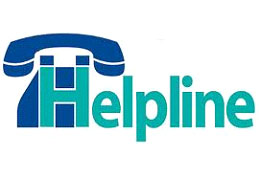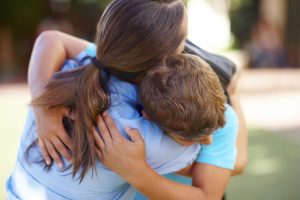Helping Your Child Cope with Tragedy & Loss
Our thoughts and prayers are with all those who are impacted by loss, tragedy or natural disasters. We know that this is not enough. Below are just a few resources to assist you. See also the links to crisis response organization websites contributing these articles for more. We hope they will be of some help and comfort as you support your children.
Topics:
- Helping Your Child Cope With Tragedy: Resources by Age
- Helping Your Child Cope With Tragedy: General Resources (See below)
- Resources in Different Languages
- Responding After a School or Community Shooting
- Responding to Media Coverage (See below)
- Responding to Natural Disasters (See below)
Disaster Distress Helpline Call 1-800-985-5990 or text “TalkWithUs” to 66746.
 The Disaster Distress Helpline, 1-800-985-5990, can provide immediate counseling to anyone who needs help in dealing with the many issues and problems that might arise from tragedy and traumatic events. Sponsored by the Substance Abuse and Mental Health Services Administration (SAMHSA), the Helpline immediately connects callers to trained and caring professionals from the closest crisis counseling center in the nationwide network of centers. Helpline staff will provide confidential counseling, referrals, and other needed support services. The Disaster Distress Helpline is a 24-hours-a-day, 7-days-a-week national hotline dedicated to providing disaster crisis counseling. The toll-free Helpline is confidential and multilingual, and available for those who are experiencing psychological distress as a result of natural or man-made disasters, incidents of mass violence, or any other tragedy affecting America’s communities.
The Disaster Distress Helpline, 1-800-985-5990, can provide immediate counseling to anyone who needs help in dealing with the many issues and problems that might arise from tragedy and traumatic events. Sponsored by the Substance Abuse and Mental Health Services Administration (SAMHSA), the Helpline immediately connects callers to trained and caring professionals from the closest crisis counseling center in the nationwide network of centers. Helpline staff will provide confidential counseling, referrals, and other needed support services. The Disaster Distress Helpline is a 24-hours-a-day, 7-days-a-week national hotline dedicated to providing disaster crisis counseling. The toll-free Helpline is confidential and multilingual, and available for those who are experiencing psychological distress as a result of natural or man-made disasters, incidents of mass violence, or any other tragedy affecting America’s communities.
Español: Llama o envía un mensaje de texto 1-800-985-5990 presiona “2.”
Our texting service also is available to Spanish speakers. Text “Hablanos” to 66746 for 24/7 emotional support. TTY for Deaf/Hearing Impaired: 1-800-846-8517
Helping Your Child Cope With Tragedy: Resources by Age
Click Here!
Helping Your Child Cope With Tragedy: General Resources
A National Tragedy: Helping Children Cope National Association of School Psychologists
After the Trauma: Helping My Child Cope UCLA Center of Mental Health in Schools
Childhood Traumatic Grief Resources for Parents and Caregivers National Child Traumatic Stress Network
Common Reactions After Trauma The National Center for Post Traumatic Stress Disorder
Coping Tips for Traumatic Events and Disasters SAMHSA
Coping with Crisis: Helping Children with Special Needs National Association of School Psychologists
Coping with a Traumatic Event Center for Disease Control
Guidelines for Working with Traumatized Children UCLA Center of Mental Health in Schools
Helping Children Cope with Tragedy Related Anxiety Mental Health America
Helping Children Cope After a Traumatic Event Child Mind Institute
How to Deal with Grief. Explains how to deal with grief as a normal response to loss or death. Describes how grief feels, how long it lasts, the four-step grieving process, and how grief differs from depression. Lists resources for more information. (SAMHSA)
Identifying Seriously Traumatized Children: Tips for Parents and Educators National Association of School Psychologists
Managing Strong Emotional Reactions to Traumatic Events: Tips for Parents and Teachers National Association of School Psychologists
Parent Information: Protecting Your Child From Suicide (English) Trauma & Crisis Project from Brigham Young University
- Spanish (Drafts)
For Teens: Coping After Mass Violence The National Child Traumatic Stress Network
Tips for Supporting Children and Youth After a Crisis Event National Association of School Psychologists
Tips for Survivors of a Disaster or Other Traumatic Event: Managing Stress This publication provides easy to read stress prevention and management tips for dealing with the effects of trauma, mass violence, or terrorism; it lists tips to relieve stress, describes how to know when to seek professional help, and provides accompanying resources. (4 pages). Source: SAMHSA
Tips for Survivors of a Traumatic Event – Managing Your Stress Gives stress prevention and management tips for dealing with the effects of trauma, mass violence, or terrorism. Lists tips to relieve stress, describes how to know when to seek professional help, and provides accompanying resources.
Tips for Survivors of a Disaster or Traumatic Event: What to Expect in Your Personal, Family, Work, and Financial Life This publication offers self-help tips for coping with the aftermath of trauma; it discusses the long-term impact of trauma, including personal uncertainties, family relationship changes, work disruptions, and financial concerns.SAMHSA
Tips for Talking With and Helping Children and Youth Cope After a Disaster or Traumatic Event Helps parents and teachers recognize common reactions children of different age groups (preschool and early childhood to adolescence) experience after a disaster or traumatic event. Offers tips for how to respond in a helpful way and when to seek support. Substance Abuse and Mental Health Service. Administration (SAMHSA)
Crisis Resources in Different Languages
Responding After a School or Community Shooting
Responding to Natural Disasters:
College Students: Coping After the Hurricane The National Child Traumatic Stress Network
Help Your Child After a Natural Disaster (Spanish) Trauma & Crisis Project from Brigham Young University
Help Your Child After a Natural Disaster (English) Trauma & Crisis Project from Brigham Young University
Helping Your Child After a Natural Disaster
Document available in English, Spanish, Portuguese, Chinese, Korean, Hmong, Haitian Creole, Tagalog, Tongan, Croatian, and Japanese Translations provided to SSWAA by Melissa Allen Heath, PhD, Brigham Young University
Document also available in Portuguese, Chinese, Korean, Hmong, Haitian Creole, Tagalog, Tongan, Croatian, and Japanese Translations provided by Melissa Allen Heath, PhD, Trauma & Crisis Project at Brigham Young University
Helping Children After a Natural Disaster: Information for Parents and Teachers Developed by the National Association of School Psychologists.
Hurricane Tools and Resources. Resources for parents and caregivers developed by the National Child Traumatic Stress Network
Responding to Media Coverage:
Helping Your Child Cope with Media Coverage After a Disaster Parent Guide. Terrorism and Disaster Center at the University of Oklahoma Health Sciences Center
Tips for Parents on Media Coverage National Child Traumatic Stress Network
Tip Sheet for Youth Talking to Journalists about the Shooting National Child Traumatic Stress Network
Preparing Your Family for an Emergency
Every Minute Counts in disaster. Make an emergency plan for you and your family. But preparing for emergencies shouldn’t fall on your shoulders alone. Young children and teens alike need to be part of the process — for their own safety and sense of empowerment.
Build a Kit, Make a Plan, Get Informed. FEMA provides guidelines to help your family prepare for an emergency.
“Get Your Kids on Your Team” Helpful information to involve your kids with emergency preparedness developed by FEMA for kids.
FEMA provides Family Communication Plans you can complete as a family and keep with you with important contact information as well as suggestions for communication if you are separated. Family Communication Plan for Kids. Family Communication Plan for Parents.
“The Safest Place During a Tornado” Watch this entertaining and educational video by The Weather Channel.


